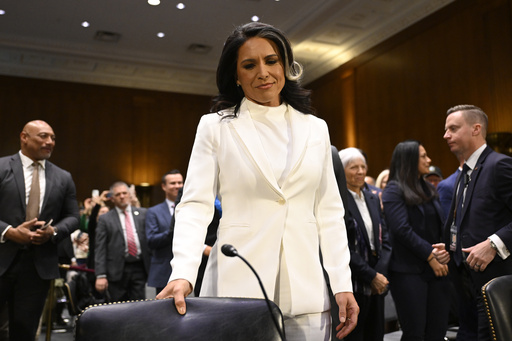
WASHINGTOM — A shift in Republican sentiment in the Senate regarding President Donald Trump’s Cabinet nominations seems to be paving the way for the confirmation of his unconventional appointees, including prominent figures Robert F. Kennedy Jr. and Tulsi Gabbard.
The Senate is set to hold votes this week on Kennedy, who is proposed as the health secretary, and Gabbard, nominated for the position of director of national intelligence. Despite their unconventional backgrounds and viewpoints, both nominees have successfully advanced to the full Senate for consideration after garnering critical support from the committees.
In an unexpected turn, GOP lawmakers have begun to align themselves with Trump’s selections, even those whose past experiences and offbeat perspectives would have previously kept them from consideration for high-profile roles. This phenomenon underscores the extent to which Republican leaders are willing to tolerate these unconventional choices, eager to display loyalty to Trump as he asserts dominance within the federal apparatus. Senate Majority Leader John Thune has quickly prioritized votes for Gabbard and Kennedy, with Gabbard’s vote being slated as the opening item on the agenda.
Interestingly, among the already appointed individuals is Defense Secretary Pete Hegseth, who confronted allegations related to alcohol use and harassment. Additionally, Republicans appear poised to back Kash Patel for the FBI Director position soon. These four nominees were initially perceived as the most susceptible to losing support from the GOP, which holds a slim three-seat majority in the Senate.
Thune expressed cautious optimism about moving forward, recognizing the potential risks but noting that the overall trends appear positive. This sentiment came just as a number of Republican senators went to Mar-a-Lago to meet with Trump over the weekend, hinting at a desire to strengthen their alliance with the former president.
However, the week was marked by uncertainty, notably due to the hesitations expressed by Senators Bill Cassidy of Louisiana and Todd Young of Indiana, who had both been vocal about maintaining an independent stance from Trump. Despite initial resistance that could have obstructed Kennedy and Gabbard’s nominations, persistent communications led by Vice President JD Vance managed to sway these pivotal senators just before the committee votes occurred.
In the aftermath of these discussions, Cassidy, known for his profession as a liver specialist, acknowledged concerns regarding Kennedy’s reputation as a vaccine skeptic. Cassidy had previously voiced his struggles with supporting the nomination due to ethical implications tied to his medical career. Similarly, Young had questions surrounding Gabbard’s previous comments regarding whistleblower Edward Snowden and his sentiments towards Russia. Vance was pivotal here too, facilitating a letter from Gabbard that detailed firm commitments regarding her handling of intelligence disclosures.
Young reflected positively on his interactions with Vance, highlighting a marked difference from Vance’s earlier approach during his Senate tenure when he often resisted GOP leadership. Now, in his new role, Vance is collaborating seamlessly with fellow Republicans to ease tensions and promote Trump’s nominees. Cassidy echoed this sentiment, acknowledging his own change of heart following his discussions about vaccine protocols with Kennedy, which ultimately led to his support.
Both Cassidy and Young asserted that concerns regarding political repercussions for defying Trump’s Cabinet nominations were not crucial to their negotiations. Nevertheless, the political reality remains daunting for them, especially Cassidy, who is facing an electoral challenge after his previous impeachment vote against Trump.
Senator Kevin Cramer commented on the broader implications of aligning with Trump, observing his transactional nature. He noted that regardless of potential endorsements, the risk of having an adversarial relationship with Trump could deter senators from challenging him openly.
Consequently, Democrats find themselves limited in their ability to oppose Trump’s Cabinet selections. With backing from Republican senators forming a solid front, Democrats are left trying to utilize procedural tactics to prolong the nomination process and maximize debate opportunities. Senator Richard Blumenthal articulated that this strategy aims to raise awareness about Trump’s increasing executive power and is intended to galvanize public outcry directed toward their representatives in Congress. The focus is particularly on those representing more conservative states, where constituents may not fully grasp the implications of these nominations.

